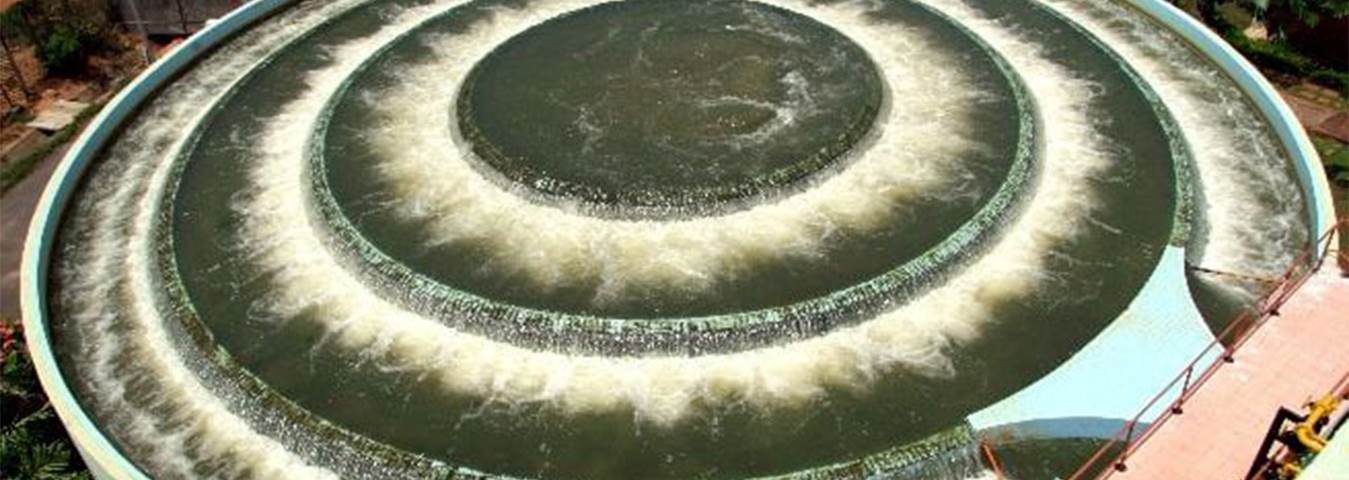The mission
Bangalore, widely regarded as the "Silicon Valley of India", is the country's second fastest-growing metropolis. This urban growth, combined with the development of commercial activity, has led to an explosion in demand for drinking water supplies and wastewater treatment.
To meet this demand, Bangalore Water Supply and Sewerage Board (BWSSB) has called on SUEZ's expertise and technology for a number of years.
To meet this demand, Bangalore Water Supply and Sewerage Board (BWSSB) has called on SUEZ's expertise and technology for a number of years.
Two decades of support, providing access to water and sanitation services
Production and distribution of drinking water
To meet drinking water requirements, Bangalore Water Supply and Sewerage Board (BWSSB) built TK Halli drinking water production plant, 95 km south of Bangalore, under its Cauvery Water Supply Scheme (CWSS). This ambitious scheme aimed to transport raw river water by gravity over a distance of 20 km, then treat the water at the plant before pumping drinking water to the city of Bangalore, which is at a higher altitude than the plant.
Since 1999, SUEZ has designed and built three drinking water production units with a total capacity of 1.55 million m3 of water/day and is also responsible for operating all these facilities. In October 2020, as part of the fifth phase of the scheme launched by BWSSB, SUEZ was awarded contracts to design, build and operate a new drinking water plant with a total capacity of 775,000 m3 of water/day, for a period of seven years, together with a treated water tank and a pumping station at the site of the TK Halli drinking water plant.
These plants produce high-quality drinking water to meet international standards thanks to advanced technologies (including Aquadaf™, a solution that offers a treatment process suited to the specific characteristics of the raw water available, and Aquazur V filters to guarantee a constant level of performance and water quality).
Since 1999, SUEZ has designed and built three drinking water production units with a total capacity of 1.55 million m3 of water/day and is also responsible for operating all these facilities. In October 2020, as part of the fifth phase of the scheme launched by BWSSB, SUEZ was awarded contracts to design, build and operate a new drinking water plant with a total capacity of 775,000 m3 of water/day, for a period of seven years, together with a treated water tank and a pumping station at the site of the TK Halli drinking water plant.
These plants produce high-quality drinking water to meet international standards thanks to advanced technologies (including Aquadaf™, a solution that offers a treatment process suited to the specific characteristics of the raw water available, and Aquazur V filters to guarantee a constant level of performance and water quality).
Wastewater treatment
SUEZ also worked with BWSSB to improve sanitation facilities in the Vrishabhavathi Valley (by building a new 150,000 m3/day wastewater treatment plant, renovating an existing 150,000 m3/day plant, and building a plant to treat and recover sewage sludge from these two wastewater treatment plants, using SUEZ Degremont® technologies - SedipacTM and Digelis™ - to turn the resulting biogas into electricity, making the plant energy self-sufficient). Today, SUEZ treats the wastewater produced by the two million people living in this outlying valley of the Bangalore metropolis.
SUEZ also designed and built a 60,000 m3/day wastewater treatment plant at Kengeri, south west of Bangalore. The Group continues to operate and maintain this plant.
SUEZ also meets the water requirements of Raja Canal industry park, which specialises in the IT and automotive sectors, by building and operating a 40,000 m3/day tertiary wastewater treatment plant that enables treated water to be reused.
SUEZ also designed and built a 60,000 m3/day wastewater treatment plant at Kengeri, south west of Bangalore. The Group continues to operate and maintain this plant.
SUEZ also meets the water requirements of Raja Canal industry park, which specialises in the IT and automotive sectors, by building and operating a 40,000 m3/day tertiary wastewater treatment plant that enables treated water to be reused.
Leak detection
Since 2016, SUEZ has been tasked with detecting leaks in the 1,750-km distribution network in the north and east of the city, using helium gas technology. This innovative technology, developed and patented by SUEZ, is particularly well adapted to the Indian networks, which work intermittently and at low pressures.
The results
SUEZ has become Bangalore's key partner, both for drinking water production and for wastewater treatment.
Following construction of the new facility and its subsequent launch in 2023, SUEZ will operate and produce a total of 2.35 million m3 of drinking water a day, supplying over 10 million inhabitants in Bangalore and its suburbs.
SUEZ also enables millions of people living in Bangalore and its suburbs to benefit from wastewater treatment, and to detect water leaks using innovative technology.
Following construction of the new facility and its subsequent launch in 2023, SUEZ will operate and produce a total of 2.35 million m3 of drinking water a day, supplying over 10 million inhabitants in Bangalore and its suburbs.
SUEZ also enables millions of people living in Bangalore and its suburbs to benefit from wastewater treatment, and to detect water leaks using innovative technology.
2,350,000
m3/day
drinking water supply capacity
> 10
million
people supplied with drinking water
400,000
m3
of wastewater treated every day
